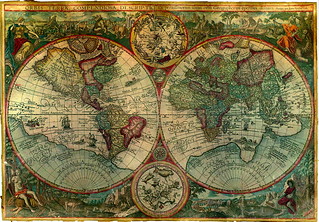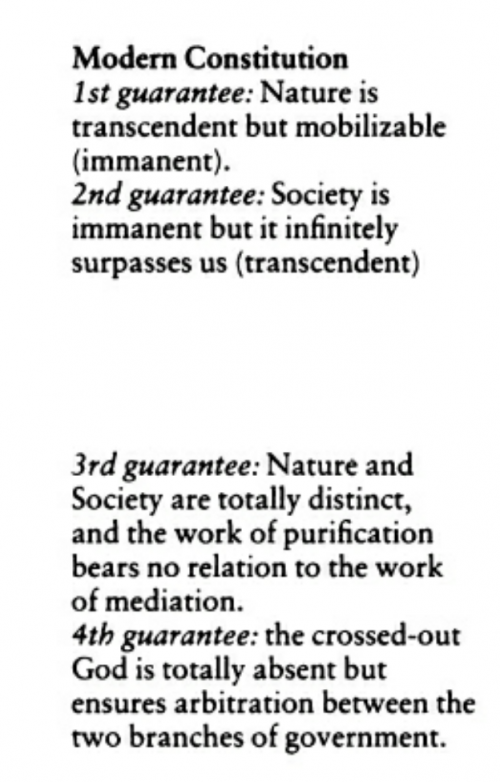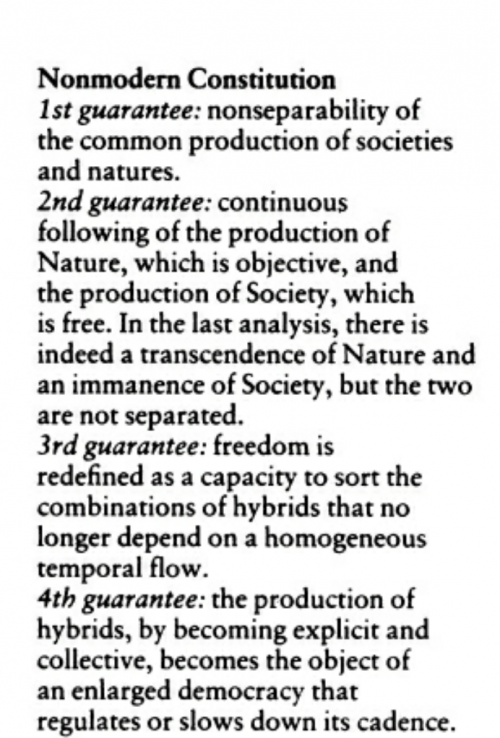We Have Never Been Modern: Conclusion
Posts in this series. In earlier posts I focused on the parts of We Have Never Been Modern by Bruno Latour that seemed relevant to my discussion of neoliberalism and its discontents. I did not discuss a number of fascinating issues raised by Latour about the state of philosophy today, and I did not exactly describe his overall project. This post will conclude my discussion of this book with two thoughts.
Background
Latour thinks the big problem with modernity is that it enables us to ignore quasi-objects and their impact on us as individuals and as a society. We do this because the tools we use to learn about things are focused on the separation of culture and nature through the work of purification. We assign objects for study to one or the other category, and use the tools we developed to study that domain to look at the problem. Latour thinks these tools are inadequate to study things that are combinations of culture and nature, which he calls quasi-objects.
The Role of Neoliberalism
Latour is worried about the unregulated and misunderstood quasi-objects that have overrun our society. He thinks what he calls the Modern Constitution facilitated the onslaught. He was writing in the early 1990s, as neoliberalism was emerging into our consciousness as the dominant economic structure. It’s not surprising that Latour ignored the important role played by this economic system. We didn’t even have a name for that system when he wrote. Latour’s foresight in recognizing the the problems that would result from failure to control quasi-objects was impressive.
Looking back, I’d argue that a big part of the blame for the failure to control quasi-objects should be assigned to the free-market economists who shilled for the capitalists, ignored any negative consequences of the changes that were underway, and assured everyone that markets were the only solution to any problem that involved the allocation of resources. One obvious example of the contribution of neoliberalism to our current plight is the failure of economists to pay attention to rising inequality and the possibility of domination of the economic and political systems by the richest capitalists and their minions.
As another example of the contribution of neoliberalism, consider the outbreak of the coronavirus COVID-19. We first saw a coronavirus in the SARS epidemic of 2003. The study of the SARS virus ramped up and began to produce results. Then the possibility of an epidemic evaporated, and work slowed to a crawl. Then the new coronavirus, COVID-19 emerged. Now we are forced into a panic-driven research project.
There was no profit in studying the coronavirus family, and therefore there was no reason to think about it during the 16 years since the emergence of SARS. The role of government is to fill that gap, but the neoliberal state is supposed to operate like a business, so government funding dried up. The government was further weakened by the selection of an incompetent and ignorant businessman as President:
“I’m a businessperson. I don’t like having thousands of people around when you don’t need them,” Trump said. “When we need them, we can get them back very quickly.”
This is a perfect example of the consequences of electing fools. But it’s also an indictment of neoliberalism.
The Role of Purification
Latour blames a lot of the problem on the work of purification, the separation of nature from culture. Purification weeds out all aspects of culture when we study the objects of nature, and weeds out all aspects of nature when we study society/culture. Obviously it’s impossible to study a rock or a proton or COVID-19 without isolating it from all other aspects of nature and culture. The work of purification is essential to any formal study of material things. But we seem to think it should be used to study culture, and that we can learn all we need to know about society through specialized tools developed to study canonical societal categories, such as politics or the economy.
The choice of things to be studied, and to some extent the methods of study, are embedded in our social structures. This fact is perhaps less important in the study of nature, but it remains a crucial fact. There are many areas of scientific research that would be valuable. The selection of the things to be studied is a function of culture, not nature. Stupid choices have horrible effects, as the failure to study coronaviruses demonstrates.
The study of culture works the same way. There is some value in looking at specific aspects of culture through closed-off academic study, such as political science, sociology, or economics. We can gain some insights into the workings of our broader culture through these disciplines. But they are not exhaustive of our understanding of culture as a whole, or of society in the broadest sense. For that we need new modes of thinking. In addition, these disciplines ignore the role played by science in the way society operates. This last is the central insight of the Nonmodern Constitution, which I discuss here.
Latour emphatically rejects postmodern thought as a way forward. In this book, he suggests applying the principles of our broadest discipline, anthropology, to our own society. That would be possible if we stripped out the Modern Constitution with its absolute separation between culture and nature and its insistence that we are not like our ancestors and our society is not like theirs in any way.
In later works, he offers a broader method of studying quasi-objects. which is generally known as Actor-Network Theory. He doesn’t like the name, for reasons discussed in this article. For further discussion, check out this Wikipedia entry.
Conclusion
We can no longer ignore the way quasi-objects change us as individuals and as a society. We have to face up to the changes they make in nature, through climate change, piles of waste, and consumption of resources. Latour thinks we need a new kind of intellectual discipline for the study of what he calls collectives, which include all groupings of people and things. I think this is a fascinating idea.



